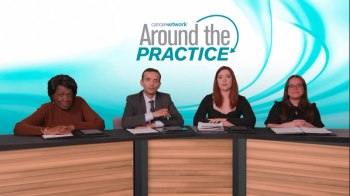
Cardiologist Anees A. Daud, MD, breaks down the typical patient with prostate cancer seen at his practice.

Your AI-Trained Oncology Knowledge Connection!


Cardiologist Anees A. Daud, MD, breaks down the typical patient with prostate cancer seen at his practice.

Urologist David Morris, MD, FACS, defines the typical patient with prostate cancer treated at his practice.

Oncologist Joelle Hamilton, MD, shares her perspective on the typical patient with prostate cancer seen at her institution.

Centering focus on a patient case of cardiovascular risk and prostate cancer, experts share their perspective on management strategies.

Comprehensive insight regarding strategies to mitigate cardiovascular risk in patients on therapy for prostate cancer.

Shared insight on a timeline of clinical studies contextualizing cardiovascular disease in the setting of prostate cancer management.

Expert perspectives on the risk of cardiovascular disease as it exists in the context of androgen deprivation therapy (ADT) and prostate cancer.

A review of novel treatment modalities for relapsed/refractory multiple myeloma, with a focus on selecting and sequencing bispecific antibodies and CAR T-cell therapies.

Expert panelists center discussion on a final patient case to review the identification and management of relapsed/refractory multiple myeloma.

Talha Badar, MBBS, MD, discussed ongoing trials in the treatment of chronic myeloid leukemia in chronic phase, as well as his hope for future therapies in the space.

Dr Stacey A. Cohen discusses how she typically monitors patients with stage II and III colorectal cancer during and after adjuvant therapy.

Stacey A. Cohen, MD, and Daniel H. Ahn, DO, describe the challenges of deciding which patients with colorectal cancer should receive adjuvant therapy, and the risk of over- and under-treatment in later stages.

Sikander Ailawadhi, MD, discussed the safety and efficacy of talquetamab in heavily pretreated patients with relapsed/refractory multiple myeloma following a readout of the phase 1/2 MonumenTAL-1 trial.

Panelists review data from the MajesTEC-1 clinical trial and elucidate the role of teclistamab therapy in patients with relapsed/refractory multiple myeloma.

Shared insight on the value of using effective regimens upfront and optimal sequencing throughout several lines of therapy in multiple myeloma.

An expert from the University of California, Los Angeles described the purpose and design of the phase 3 NAPOLI-3 study, assessing NALIRIFOX in metastatic pancreatic ductal adenocarcinoma.

Talha Badar, MBBS, MD, discussed how results from the phase 3 ASCEMBL study of asciminib will impact clinical practice in treating chronic myeloid leukemia in chronic phase.

A review of the process of “step-up” doses in teclistamab therapy for multiple myeloma and their use.

A review of the process of giving a patient a dose of teclistamab from start to finish.

Although opioid use guidelines from the Centers for Disease Control exclude patients with cancer, drug screenings are required that could further contribute to racial disparities.

Talha Badar, MBBS, MD, discussed the unmet needs in the treatment of chronic myeloid leukemia in chronic phase.

Oncology expert panelists review patient subgroup analyses for MAIA and SWOG0777 studies, investigating treatments for transplant-ineligible patients with newly diagnosed multiple myeloma.

Expert panelists review clinical data from studies investigating treatment regimens for patients with NDMM that are transplant-ineligible.

Talha Badar, MBBS, MD, discussed the results of the phase 3 ASCEMBL trial, demonstrating the superiority of asciminib versus bosutinib in patients with chronic myeloid leukemia in chronic phase.

Hans Hammers, MD, shares whether the updated CLEAR trial data would make him consider an IO-TKI regimen for patients with advanced RCC over an IO-IO regimen.

A brief review of non–BCMA-targeted bispecific antibodies under investigation in patients with relapsed/refractory multiple myeloma.

Brian Rini, MD, presents updated data from the CLEAR trial of lenvatinib plus pembrolizumab versus sunitinib in frontline advanced renal cell carcinoma.

Expert perspectives on recent clinical data on BCMA-targeted bispecific antibody therapy in patients with relapsed/refractory multiple myeloma.

An expert from Dana-Farber Cancer Institute says that policymakers and insurers should take a hard look at policies that restrict opioid use in patients with cancer who are at end of life, especially for underserved communities.

After assessing racial disparities in opioid access in older patients with cancer, an expert from Dana-Farber Cancer Institute speaks to the need for examining younger populations and those with different insurance types.